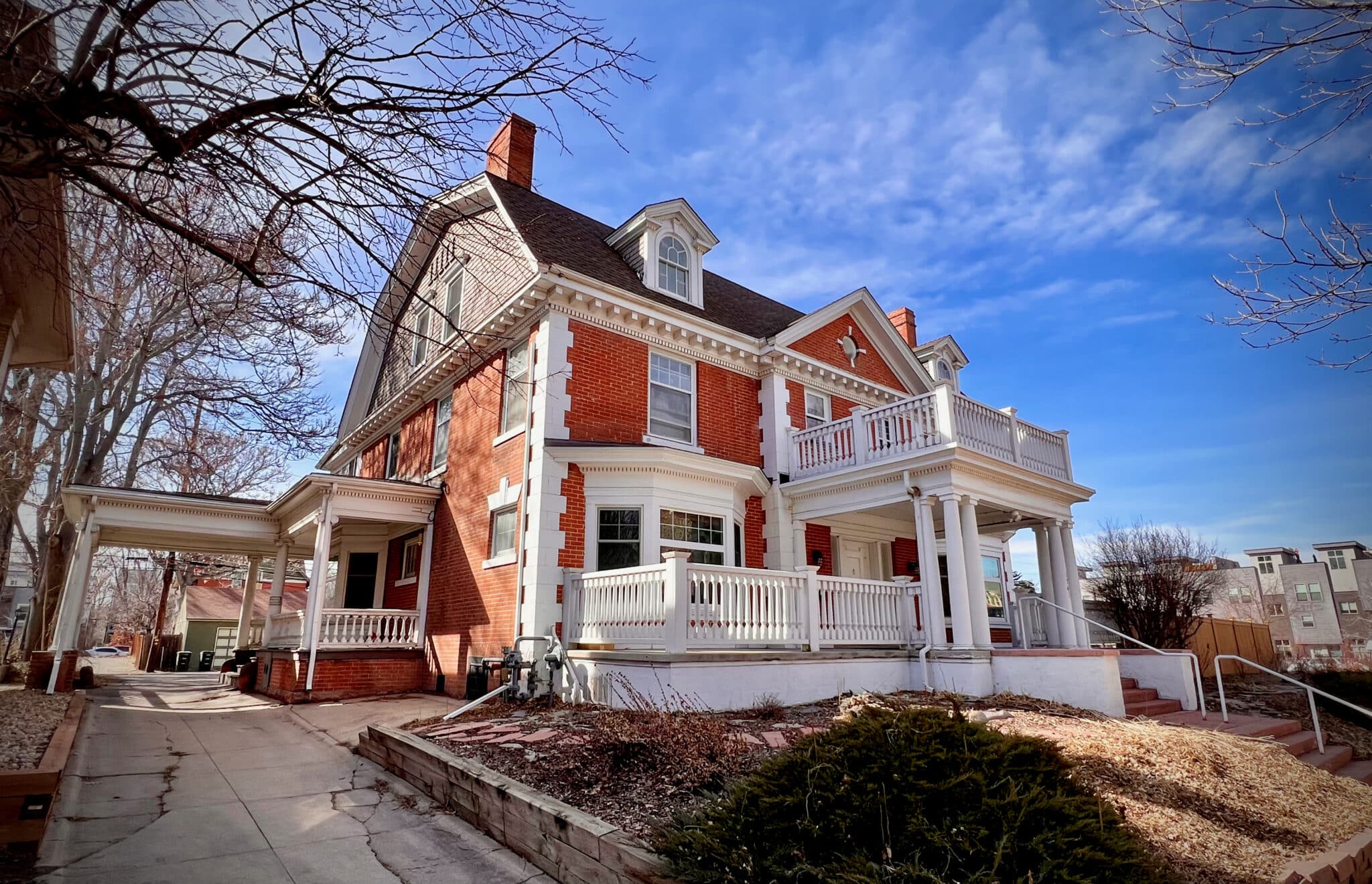
Michael Mathieson at a property he owns in RiNo on Friday, March 31, 2023. (Hyoung Chang/The Denver Post)
The owner of a 120-year-old home in the City Park West neighborhood has sued Denver for designating it a city landmark.
Developer Mike Mathieson’s lawsuit, filed Monday in Denver District Court, asks a judge to reverse the decision that the Denver City Council made late last month.
The suit makes a host of arguments for why that should happen, including that one councilwoman should have recused herself from the vote, and that a former resident of the house held up by preservationists as notable was likely in the Klu Klux Klan.
The Denver City Attorney’s Office declined to comment on the lawsuit.
Mathieson and his partners paid $1.5 million in 2021 for the approximately 7,000-square-foot home at 1741 Gaylord St. He wanted its 0.36-acre lot, and planned to demolish the home and construct an apartment building.
But his request for a demolition eligibility certificate prompted neighbors to rally to save the home, and council voted 10-0 on April 24 to give it landmark status. That designation effectively prevents demolition. It was just the second time an individual structure was landmarked against the wishes of its owner.

The home at 1741 Gaylord St. dates to the early 1900s. (Courtesy Historic Denver)
The home, vacant since a Mathieson bought it from a nonprofit that had its offices in the building, has sat unused since the vote. Preservation advocates have said they want it repurposed into housing, and that new development could take place on the rear of the lot.
The lawsuit said Mathieson has received one offer for the property since the landmark designation process began — for $200,000 less than he paid.
Mathieson’s lawsuit reiterates some arguments that he made in public meetings and previous interviews with BusinessDen. He said he bought the home after reviewing a 2019 “Discover Denver” report focused on the neighborhood. That report, a collaboration between the city and the nonprofit Historic Denver, did not include the home on a list of 61 buildings that “might be architecturally significant,” nor in various “areas of significance.”
Mathieson again argues that there’s not clear enough evidence that the home was the work of a “recognized architect,” as the landmark ordinance requires, and that the people associated with the home — who are supposed to be “a recognized person or group of persons who had influence on society” — aren’t particularly prominent.
The lawsuit also introduces new arguments. Mathieson argues that James Burger, a former resident of the home who was a state senator from 1907 to 1911, was likely a KKK member.
“James C. Burger was a Freemason, and a Shriner,” the lawsuit states. “During his membership in these mostly secret societies and during his time in Colorado politics, the Ku Klux Klan was interwoven with these organizations, and everyone, from the city council to the mayor, to the governor had ties to the Ku Klux Klan … This is certainly not honorable or deserving of historic recognition.”
The lawsuit also argues that Councilwoman Amanda Sandoval was “required” to recuse herself from the vote because of a “history of intense personal animosity and bias” toward Mathieson.
In an email to Sandoval the week before the vote, Mathieson’s attorney Parker Semler said Sandoval had “publicly expressed” her disdain for Mathieson in the past.
“The genesis of what appears to be a vendetta is your anger over your belief that Mr. Mathieson failed to pay a proper price for property sold to him by your father on the corner of 44th Street and Tennyson,” Semler wrote on April 20.
Sandoval wrote back nine minutes later disputing Semler’s characterization.
“I have no conflict of interest on this property, therefore I believe your request is invalid,” Sandoval said.
Sandoval declined to comment when reached by BusinessDen Wednesday.
Mathieson also objects to the fact that two council members participated and voted remotely at the meeting, which he said meant they “could not properly evaluate the evidence” submitted in-person that evening.
Mathieson’s suit also targets the city’s landmark process more broadly. It cites a recent vote by the Landmark Preservation Commission about a Cap Hill church’s plans to build affordable housing on its parking lot, as reported by Westword earlier this month.
“The City’s attempt to restrict development of a parking lot which obviously has no historic qualities … illustrates that the Ordinance is currently being used by the City not for its stated purpose of preserving historic structures, but instead, to oppose development projections, that could otherwise be built as a matter of right as authorized by the City’s zoning codes,” the lawsuit reads.
Mathieson wants the landmark ordinance declared “unconstitutionally void for vagueness.” He is represented by attorneys Parker Semler and Andrew Oh-Willeke of Semler & Associates.

Michael Mathieson at a property he owns in RiNo on Friday, March 31, 2023. (Hyoung Chang/The Denver Post)
The owner of a 120-year-old home in the City Park West neighborhood has sued Denver for designating it a city landmark.
Developer Mike Mathieson’s lawsuit, filed Monday in Denver District Court, asks a judge to reverse the decision that the Denver City Council made late last month.
The suit makes a host of arguments for why that should happen, including that one councilwoman should have recused herself from the vote, and that a former resident of the house held up by preservationists as notable was likely in the Klu Klux Klan.
The Denver City Attorney’s Office declined to comment on the lawsuit.
Mathieson and his partners paid $1.5 million in 2021 for the approximately 7,000-square-foot home at 1741 Gaylord St. He wanted its 0.36-acre lot, and planned to demolish the home and construct an apartment building.
But his request for a demolition eligibility certificate prompted neighbors to rally to save the home, and council voted 10-0 on April 24 to give it landmark status. That designation effectively prevents demolition. It was just the second time an individual structure was landmarked against the wishes of its owner.

The home at 1741 Gaylord St. dates to the early 1900s. (Courtesy Historic Denver)
The home, vacant since a Mathieson bought it from a nonprofit that had its offices in the building, has sat unused since the vote. Preservation advocates have said they want it repurposed into housing, and that new development could take place on the rear of the lot.
The lawsuit said Mathieson has received one offer for the property since the landmark designation process began — for $200,000 less than he paid.
Mathieson’s lawsuit reiterates some arguments that he made in public meetings and previous interviews with BusinessDen. He said he bought the home after reviewing a 2019 “Discover Denver” report focused on the neighborhood. That report, a collaboration between the city and the nonprofit Historic Denver, did not include the home on a list of 61 buildings that “might be architecturally significant,” nor in various “areas of significance.”
Mathieson again argues that there’s not clear enough evidence that the home was the work of a “recognized architect,” as the landmark ordinance requires, and that the people associated with the home — who are supposed to be “a recognized person or group of persons who had influence on society” — aren’t particularly prominent.
The lawsuit also introduces new arguments. Mathieson argues that James Burger, a former resident of the home who was a state senator from 1907 to 1911, was likely a KKK member.
“James C. Burger was a Freemason, and a Shriner,” the lawsuit states. “During his membership in these mostly secret societies and during his time in Colorado politics, the Ku Klux Klan was interwoven with these organizations, and everyone, from the city council to the mayor, to the governor had ties to the Ku Klux Klan … This is certainly not honorable or deserving of historic recognition.”
The lawsuit also argues that Councilwoman Amanda Sandoval was “required” to recuse herself from the vote because of a “history of intense personal animosity and bias” toward Mathieson.
In an email to Sandoval the week before the vote, Mathieson’s attorney Parker Semler said Sandoval had “publicly expressed” her disdain for Mathieson in the past.
“The genesis of what appears to be a vendetta is your anger over your belief that Mr. Mathieson failed to pay a proper price for property sold to him by your father on the corner of 44th Street and Tennyson,” Semler wrote on April 20.
Sandoval wrote back nine minutes later disputing Semler’s characterization.
“I have no conflict of interest on this property, therefore I believe your request is invalid,” Sandoval said.
Sandoval declined to comment when reached by BusinessDen Wednesday.
Mathieson also objects to the fact that two council members participated and voted remotely at the meeting, which he said meant they “could not properly evaluate the evidence” submitted in-person that evening.
Mathieson’s suit also targets the city’s landmark process more broadly. It cites a recent vote by the Landmark Preservation Commission about a Cap Hill church’s plans to build affordable housing on its parking lot, as reported by Westword earlier this month.
“The City’s attempt to restrict development of a parking lot which obviously has no historic qualities … illustrates that the Ordinance is currently being used by the City not for its stated purpose of preserving historic structures, but instead, to oppose development projections, that could otherwise be built as a matter of right as authorized by the City’s zoning codes,” the lawsuit reads.
Mathieson wants the landmark ordinance declared “unconstitutionally void for vagueness.” He is represented by attorneys Parker Semler and Andrew Oh-Willeke of Semler & Associates.
